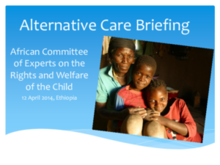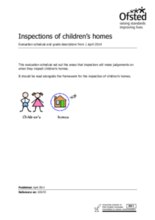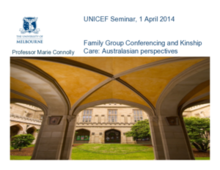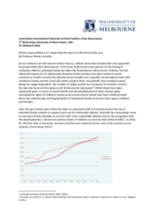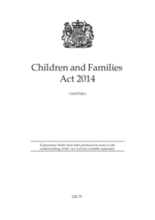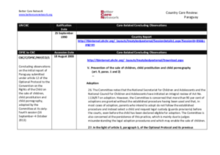Displaying 1131 - 1140 of 1796
This article provides an overview of the current situation in the out-of-home care in Norway and Sweden. Development in later years is described and discussed, including the trends towards privatization of the welfare system in both countries and the role of private, commercial actors within the care sector including out-of-home care for children and young people.
This presentation, produced by Better Care Network (BCN), International Social Service (ISS), Save the Children, and SOS Children's Villages, was given at a 2014 briefing of the African Committee of Experts on the Rights and Welfare of the Child (ACERWC). The objectives of the Alternative Care Briefing were to increase the understanding of and recommendations on the implementation of the Guidelines for the Alternative Care of Children when reviewing State Party Reports and drafting general recommendations and to create opportunities to promote the Guidelines for the Alternative Care of Children in its 5th anniversary.
Deportation of immigrant, undocumented parents of citizen-children born in the United States is a practice that has caused the separation of families and a variety of negative effects on the children.
This evaluation schedule set out the areas that inspectors will make judgements on when they inspect children’s homes in the UK. It should be read alongside the framework for the inspection of children’s homes.
This webinar presentation by Professor Marie Connolly of the University of Melbourne introduces the history and background of Family Group Conference (FGC) in New Zealand and Australia and discusses the influence of FGC on the development of formal or statutory kinship care in the region.
In this presentation Professor Connolly reviews recent trends in the use of kinship care in Australia and discusses what this shift means in the context of the ‘residual’ model of child protection used in the country.
This paper presents the findings of a survey of Russian care leavers. The emphasis is on care leavers' experiences of the Russian institutional care system, and the issues that impacted on their postcare transition to adulthood.
An Act in the United Kingdom to make provision about children, families,and people with special educational needs or disabilities; to make provision about the right to request flexible working; and for connected purposes.
This country care review includes the care related Concluding Observations adopted by the Committee on the Rights of Persons with Disabilities as part of its examination of Paraguay's initial report adopted by the Committee at its ninth session, as well as other care-related concluding observations, ratification dates, and links to the Universal Periodic Review and Hague Intercountry Adoption Country Profile.
Infant Mental Health Journal has published an important Special Issue on Global Research, Practice, and Policy Issues in the Care of Infants and Young Children at Risk. This article describes the adverse mental health effects of violence and abuse in an institution in Tanzania.

